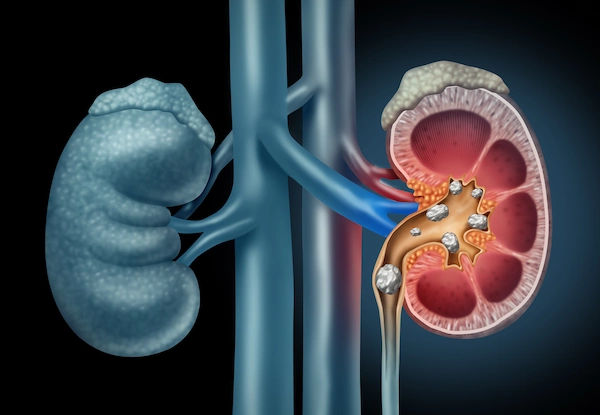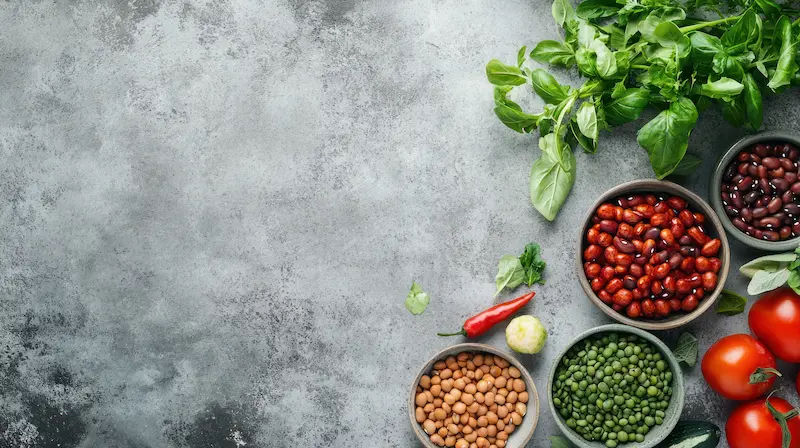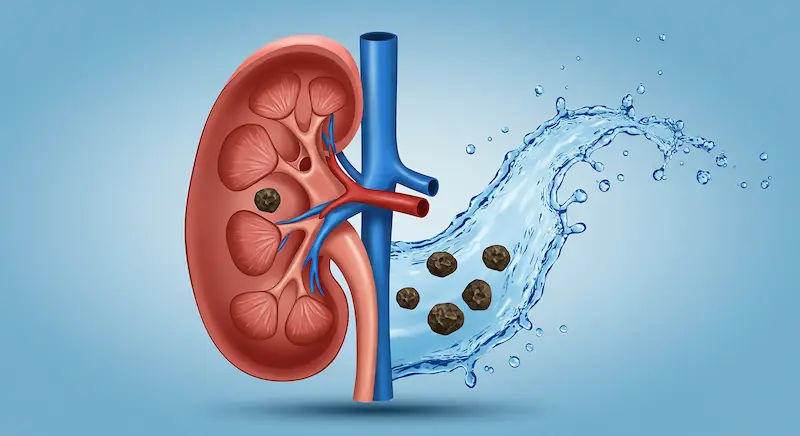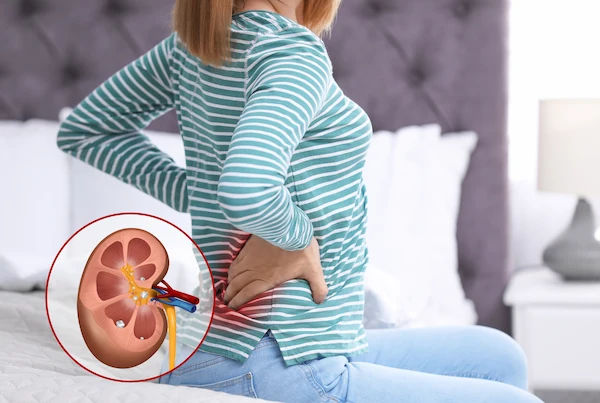Guide to Kidney Stones Awareness
Learn everything you need to know about kidney stones — from causes and symptoms to diagnosis, treatment, and prevention. Discover practical tips to stay stone-free and protect your kidney health.

Written by Dr. M L Ezhilarasan
Reviewed by Dr. Dhankecha Mayank Dineshbhai MBBS
Last updated on 13th Jan, 2026
.webp?tr=q-80,f-webp,w-350,dpr-2,c-at_max 700w)
Introduction
Kidney stones are a common yet often underestimated health problem. A sudden, sharp pain in your back or side that seems to come in waves is a hallmark symptom—and it’s more frequent than you might think. With rising temperatures, fast-paced lifestyles, and evolving diets, kidney stone cases have surged globally. This guide to kidney stone awareness explains what stones are, how they form, who’s most at risk, and the practical steps to prevent them. You’ll learn the early warning signs and red flags that indicate when to seek urgent medical help, as well as the diagnostic tests, imaging, and treatments used to manage or remove stones. Most importantly, we’ll focus on everyday prevention—hydration habits, dietary choices, and small routines that significantly lower your risk of recurrence. Whether you’ve experienced a kidney stone before or want to avoid your first, this comprehensive article combines clear, evidence-based insights and actionable tips to help you safeguard your kidney health. If symptoms persist or you’re unsure of your next step, a timely medical evaluation can make all the difference.
Consult a Top Nephrologist for Personalised Advice
Kidney Stones at a Glance
This section provides an overview of what kidney stones are and how they form in the body.
What Are Kidney Stones?
Kidney stones are hard, crystalline deposits formed from minerals and salts in the urine. They often develop in the kidneys but can travel down the urinary tract, causing severe pain as the body attempts to expel them. Despite the singular term, kidney stones can occur multiple times in a person’s life.
How and Why Stones Form
Stones form when urine becomes overly concentrated, allowing minerals to crystallise and stick together. Dehydration, poor diet, and certain medical conditions can increase the risk. Without enough urine inhibitors like citrate, these crystals grow and combine into larger stones capable of causing blockages and discomfort.
Types of Stones (Calcium Oxalate, Uric Acid, Struvite, Cystine)
Most kidney stones are calcium oxalate, while others include uric acid, struvite (infection-related), or cystine (genetic). Identifying the stone type is vital to guide prevention, as each responds differently to dietary and medical interventions.
How Common Are They and Who’s at Risk?
This section explains the prevalence of kidney stones and the factors that increase your risk.
Prevalence and Recurrence
Roughly 1 in 10 people will experience kidney stones in their lifetime, with men affected slightly more often. Without prevention, recurrence rates can reach up to 50% within a decade, making lifestyle adjustments essential.
Lifestyle, Medical, and Medication Risk Factors
Dehydration is the leading modifiable risk factor. High sodium intake, excessive animal protein, and oxalate-rich foods can contribute to stone formation. Conditions like obesity, diabetes, gout, or bowel disease further increase risk, as do some medicines and genetic factors.
Climate and Hydration Awareness
Hot climates and heavy sweating increase the likelihood of stone formation due to concentrated urine. Staying hydrated, particularly when active outdoors, is crucial. Aim for pale-yellow urine to ensure optimal hydration levels.
Recognising Symptoms and When to Seek Help
Learn how to identify kidney stone symptoms and when to seek urgent medical attention.
Classic Symptoms vs Subtle Signs
Severe, wave-like pain in the side or back that may spread to the abdomen or groin is a hallmark symptom. Blood in the urine, nausea, vomiting, and urinary urgency are also common. Some stones cause only mild or hidden symptoms.
Red Flags: When It’s an Emergency
Seek urgent medical help if you experience fever, chills, or uncontrollable pain, as these may indicate infection or blockage. Such situations can become life-threatening without immediate treatment.
First Steps at Home
If the pain is tolerable, rest, hydrate, and use heat packs for relief. Over-the-counter pain medicine may help, but if symptoms persist beyond two weeks, consult a doctor online with Apollo 24|7.
Getting Diagnosed: Tests and Imaging
This section explores how doctors diagnose kidney stones through tests and imaging.
Urinalysis, Blood Tests, and Culture
Initial investigations include urinalysis and blood tests to assess kidney function and detect infection. A 24-hour urine collection may identify risk factors for recurrent stones. Apollo24|7 offers convenient home sample collection for these tests.
Imaging: Ultrasound vs Non-Contrast CT
Ultrasound is often the first choice, particularly during pregnancy. However, non-contrast CT scans are the gold standard for confirming stone size and location with high accuracy.
Stone Analysis and 24-Hour Urine Evaluation
Passing a stone allows for analysis, revealing its chemical makeup. Combined with 24-hour urine testing, this helps doctors tailor diet and medication plans to prevent recurrence.
Treatment Pathways: From Watchful Waiting to Surgery
Here, we cover various treatment options based on stone size and severity.
Watchful Waiting and Medical Expulsive Therapy
Small stones often pass naturally. Doctors may prescribe medication like tamsulosin to relax the ureter and assist passage, while ensuring adequate hydration and pain control.
Shock Wave Lithotripsy (SWL)
SWL uses sound waves to break stones into smaller pieces that can be passed naturally. It is non-invasive and suitable for stones under two centimetres, though some may need repeat sessions.
Ureteroscopy (URS) and Laser Lithotripsy
In URS, a thin scope enters through the bladder to access and fragment stones with a laser. It offers high success rates and a short recovery time.
Percutaneous Nephrolithotomy (PCNL)
For large or complex stones, PCNL involves a small incision to directly remove or fragment the stone. It usually requires a short hospital stay but provides excellent stone clearance.
Pain Relief, Antibiotics, and Follow-Up
Strong pain may need prescription medication, and infections require antibiotics before further procedures. If symptoms persist, schedule a follow-up or an in-person consultation with Apollo 24|7.
Everyday Prevention That Works
Learn practical daily habits that lower your risk of forming kidney stones.
Hydration Goals and Urine Colour
Aim to produce at least two to two-and-a-half litres of urine daily by drinking roughly three litres of fluids. Water is best—add lemon or lime juice for extra citrate, a natural stone inhibitor.
Diet Essentials: Calcium, Oxalate, Sodium, Protein
Maintain normal calcium intake, limit sodium, and moderate animal protein. Pair oxalate-rich foods with calcium to reduce absorption and stone risk.
Citrate, Lemon Water, and Dietary Patterns
Citrate from citrus fruits prevents crystal formation. Lemon water is a simple and effective way to boost citrate levels naturally.
Weight, Activity, and Metabolic Health
Regular activity supports healthy metabolism. A balanced, plant-rich diet like DASH can reduce stone recurrence and support overall kidney function.
Special Situations and Tailored Advice
This section guides groups with unique needs or risks.
Pregnancy
Ultrasound is the safest diagnostic tool in pregnancy. Many cases are managed conservatively with fluids and safe pain relief, coordinated between obstetric and urology teams.
Children and Adolescents
Kidney stones are rising in young populations. Adequate hydration, reduced salt intake, and avoidance of sugary drinks are key preventive steps.
Single Kidney, Transplant, or Frequent Flyers
For people with one kidney or repeated stone episodes, prompt evaluation and detailed metabolic workup are vital to protect kidney function.
Understanding Your Lab and Stone Reports
This section explains how to interpret your lab and stone analysis results.
Common Abnormalities (Hypercalciuria, Hypocitraturia, Hyperoxaluria)
Each abnormality requires tailored management—reducing sodium, increasing citrate intake, and balancing calcium with oxalate can all help.
Matching Prevention to Your Profile
Prevention depends on stone type: uric acid stones benefit from urine alkalinisation, while cystine stones need increased fluid and medication. Bring your results to a clinician; Apollo 24|7 offers online consultations for review and planning.
Myths, Mindsets, and Living Well After a Stone
Here, we debunk myths and share strategies for long-term management.
Myth-Busting
Common misconceptions—like cutting all calcium or blaming only spinach—can worsen stone risk. Prevention requires a balanced, evidence-based approach.
Coping Strategies and Follow-Up Cadence
Develop hydration habits, track your symptoms, and follow up with imaging as advised. Early detection and steady lifestyle adjustments are key to preventing recurrence.
Costs, Access, and Practical Resources (India-Focused)
This section covers cost considerations and access to convenient healthcare services.
Typical Costs and Insurance Basics
Ultrasound scans are generally affordable, while CT and surgical procedures vary by hospital. Check your insurance plan for diagnostic and treatment coverage.
Teleconsultation and Lab Home Collection
Start with teleconsultation for mild or improving symptoms. If symptoms persist beyond two weeks, consult a doctor online with Apollo24|7. For lab work, Apollo24|7 offers home collection services for urinalysis and kidney function tests.
Conclusion
Kidney stones are painful but largely preventable. Understanding how they form, spotting early warning signs, and adopting small, consistent habits can dramatically lower your risk. Hydration, a balanced diet, and proper medical follow-up make prevention achievable. When stones occur, early diagnosis and tailored care—from watchful waiting to minimally invasive procedures—restore comfort and protect long-term kidney health. For persistent symptoms or personal prevention advice, consult a doctor online with Apollo 24|7, where home test collection is also available.
Consult a Top Nephrologist for Personalised Advice
Consult a Top Nephrologist for Personalised Advice

Dr. Prakash Pandharinath Ugale
Nephrologist
8 Years • MBBS MD DNB (Nephro)
Nashik
Apollo Hospitals Nashik, Nashik

Dr. Seerapani Gopaluni
Nephrologist
18 Years • MBBS, MRCP(UK), CCT(Oxford), PhD(Cambridge), FRCP(London)
Hyderabad
Apollo Hospitals Financial District, Hyderabad

Dr. Sunil Jawale
Nephrologist
17 Years • MBBS, MD (Internal Medicine), DM (Nephrology)
Pune
Apollo Hospitals Pune, Pune

Dr. Umesh Chandra Sahu
Nephrologist
32 Years • MBBS,MD ( General Medicine ). Sr. Consultant ( Nephrology )
Rourkela
Apollo Hospitals, Rourkela, Rourkela

Dr. Manju Kamal
Nephrologist
12 Years • MBBS,MD(General Medicine), DNB,DM(Nephrology)
Angamaly
Apollo Hospitals Karukutty, Angamaly
Consult a Top Nephrologist for Personalised Advice

Dr. Prakash Pandharinath Ugale
Nephrologist
8 Years • MBBS MD DNB (Nephro)
Nashik
Apollo Hospitals Nashik, Nashik

Dr. Seerapani Gopaluni
Nephrologist
18 Years • MBBS, MRCP(UK), CCT(Oxford), PhD(Cambridge), FRCP(London)
Hyderabad
Apollo Hospitals Financial District, Hyderabad

Dr. Sunil Jawale
Nephrologist
17 Years • MBBS, MD (Internal Medicine), DM (Nephrology)
Pune
Apollo Hospitals Pune, Pune

Dr. Umesh Chandra Sahu
Nephrologist
32 Years • MBBS,MD ( General Medicine ). Sr. Consultant ( Nephrology )
Rourkela
Apollo Hospitals, Rourkela, Rourkela

Dr. Manju Kamal
Nephrologist
12 Years • MBBS,MD(General Medicine), DNB,DM(Nephrology)
Angamaly
Apollo Hospitals Karukutty, Angamaly
More articles from Kidney stones
Frequently Asked Questions
What is the best drink for kidney stones?
Water is best. Aim for pale-yellow urine and consider adding lemon or lime for natural citrate benefits.
How long does a small kidney stone (3–5 mm) take to pass?
Usually within a few days to weeks. If symptoms persist beyond two weeks, consult a doctor online with Apollo24|7.
Which foods should I avoid for kidney stone prevention?
Limit high-oxalate foods like spinach and nuts, reduce sodium, and maintain normal calcium intake.
Can lemon water dissolve kidney stones?
Lemon water doesn’t dissolve existing stones but helps prevent new ones by raising urinary citrate.
When should I go to urgent care for a kidney stone?
Seek immediate help if you have fever, chills, severe pain, vomiting, or reduced urine output.




